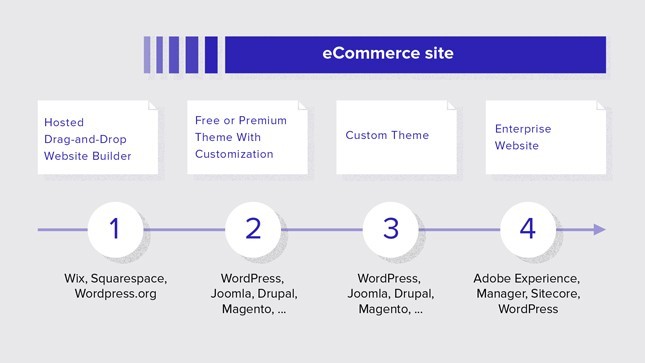- What are custom WordPress themes?
- What is WordPress theme customization?
- When do you use custom WordPress themes and WordPress theme customization?
- Choosing between a premium theme and a custom theme
- Where to get help with WordPress theme customization services
- Where to get help with building custom WordPress themes
- Conclusion
The terms “custom WordPress theme” and “WordPress theme customization” are semantically similar. But to us who work with custom WordPress development on a daily basis, they are very different.
We’ve noticed that even some established web agencies and WordPress development companies cannot separate the two, so let’s get the terms straight. A clear taxonomy is more powerful than you might think for preventing miscommunication.
What are custom WordPress themes?
A custom WordPress theme is a theme developed for a specific need. Typically it’s a business website that was designed using Photoshop, Sketch, Adobe XD, InDesign, Figma or any other design tool of choice. The design mockups were then handed over to a developer, who built a custom front-end hooked up to a WordPress installation that is essentially the working website version of the designs.
The opposite of a custom WordPress theme would be a WordPress theme that’s…not custom, but rather an out-of-the-box theme. To beginners, this is probably the first type of WordPress theme you’ll encounter. A WordPress site always has a theme, and pre-built ones are readily available both in the default installation files you get from WordPress (Twenty Ten, Twenty Eleven… Twenty Nineteen, etc.) and from marketplaces such as ThemeForest and ElegantThemes.
What is WordPress theme customization?
As the name suggests, WordPress theme customization is an activity rather than a “thing”. While it could refer to the process of building a custom WordPress theme, it’s more commonly used when speaking of setting up a WordPress website using a pre-built theme.
“Customization” suggests you’re mostly doing tweaks and edits to something that already exists, like the theme you have purchased from ThemeForest. When you get the theme, you’ll have a number of templates to choose from, and probably some page-builder functionality where you can move around sections on each template as well. The customization you’ll be doing is setting up the pages your website needs with the templates that were provided, and fill them with your creative content and images.
If you’re going toward the deep end of the WordPress theme customization pool, you’ll be installing plugins that give you new features that weren’t provided in the WordPress theme out-of-the-box.
However, to make things a bit trickier, what “already exists” could also be a custom WordPress theme that you need to make edits to – i.e. customize. Maybe your client needs another page added, change the designs a bit, or introduce a new feature to make reservations for instance. Then you’d also be searching for a developer to help you with WordPress theme customization services.
When do you use custom WordPress themes and WordPress theme customization?
Let’s take one step back and look at the whole spectrum of website development from the simplest to most complex.

#1 Hosted Drag-and-Drop Website Builders
On the “simplest” side, you’ll find the types of sites that someone without technical skills would set up themselves in a few hours. In this space, you’ll be looking at either setting up a WordPress.org website or opting for a non-WordPress solution with drag-and-drop functionality like Wix or Squarespace.
#2 Theme Customizations
Next is where the WordPress theme customizations come into play. By purchasing a WordPress theme (or downloading a free one) you can host your website wherever you want to, and have more access to plugins and freelance developers to help you. This means you can lower your monthly hosting cost, and do a bit more custom work than you get with the hosted drag-and-drop tools.
#3 Custom Themes
In the third category of websites, you’ll find the custom WordPress themes. Instead of getting a templated solution that risks making your website look just like someone else’s (more likely than not) you’ll get a website tailored to your business. The drawback is of course that if you’re not both a designer and a developer, you’ll need to get some help from experts. The upside is you’ll get help from experts, and the result will probably help market whatever it is that your website is selling.
In this third category, you’ll find a host of other CMS’s (Content Management Systems) like Drupal, Joomla, Magento and more.
Overlapping the third category you have small and medium-size eCommerce sites. It’s not much different from a regular custom WordPress theme, it just has an eCommerce plugin (probably WooCommerce) running that takes care of the added functionality. However, you also have the option of going for an eCommerce-focused CMS like Shopify and do either a custom website there or a drag-and-drop-yourself type website.
#4 Enterprise Websites
For enterprise-level eCommerce or information websites, you’ll find a few additional players on the market. Some are global, but there are also more local ones. Examples include Sitecore, Adobe Experience Manager and EpiServer. Interestingly though, we see a trend where WordPress is taking market shares also in the enterprise segment. Examples include university multi-sites, and famous media companies like CNN, Time Inc, and USA Today that are mentioned in this nice article on enterprise-level WordPress by Pagely.
It requires more from the development company than a “normal” WordPress site of course, but the openness of the WordPress platform in combination with much lower lock-in effects and license fees makes it an attractive alternative to the Enterprise-focused platforms. Hosting company WP Engine has support for enterprise-size WordPress sites and I’m sure others have too.
“It requires more from the development company than a “normal” WordPress site of course, but the openness of the WordPress platform in combination with much lower lock-in effects and license fees make it an attractive alternative to the Enterprise-focused platforms.”
Choosing between a premium theme and a custom theme
Most businesses would fit into the “Custom WordPress Theme” category, but if you’re on either the smaller end or the bigger end you’ll find there are other options that could be better suited for your budget and your needs.
The cost of a custom WordPress site is a lot higher than the price of a premium theme, probably by a factor of 100-200. However, that’s only from a direct expense point of view so not counting your own hours for customizing the theme and scratching your head, and not taking into account the value of getting a custom website.
So if you need some help navigating to make up your mind, you will probably find the following two articles useful that we’ve written before on this blog:
- How much does a WordPress website cost?
- Choosing between a custom WordPress theme and a premium theme
Where to get help with WordPress theme customization services
If you need a website and you decide it’s not worth to get a custom theme for your business, you can either have a go at it yourself with customizing a theme or ask for help. The work itself becomes a mix of understanding your business, selecting a theme, “designing” the site by customizing the theme and launching the site.
You’ll probably find freelancers and small design-and-development agencies or outsourcing companies the best fit for helping you.
Where to get help with building custom WordPress themes
If you’re looking for a custom theme as an end customer, you’ll need to have someone design it first. The best way to go about it would be to contact your local digital agency that can help you with both design and development. Alternatively, you can find a freelance designer to prepare the mockups and then find a freelance developer to do the build but this setup is more likely to lead to some issues along the way.
While we do custom WordPress development day in, day out, we only work as a subcontractor to digital agencies and cannot help you if you’re an end customer. But if you are an agency looking for more developers, you can turn to us or to freelance developers to build the sites you’ve designed for your clients.
Conclusion
To answer the main question of this article, WordPress theme customization can refer to either the creation of a website from a pre-existing theme or to the modification of an existing WordPress site that could be either custom-built or based on a purchased theme.
Custom WordPress theme, on the other hand, is a one-off theme created based on custom designs for a specific website and is a better fit if you’re ready to invest a bit more in your website.
Now that you’re in the know, it’s time to get started:
- Build your own site from a premium theme: ThemeForest
- Get help to design and build a custom theme: Google to find a good digital agency
- Extend your agency’s custom theme development team: White Label Agency homepage
Is this how you use the terms as well? Leave us a comment to start a discussion.



